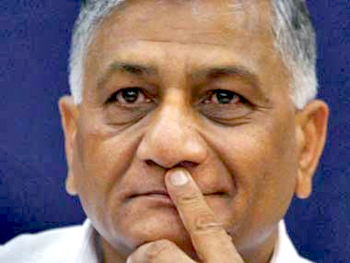New Delhi, Mar 23: Shortly after representing the Government at the national day reception at Pakistan High Commission tonight which kicked up a storm, Minister of State for External Affairs V K Singh issued a series of intriguing tweets defining "disgust" and "duty" indicating that he may have been unhappy at being deputed to it.
 In the first of the five quick tweets, Singh, a former Army Chief, said, "To offend the moral sense, principles, or taste of".
In the first of the five quick tweets, Singh, a former Army Chief, said, "To offend the moral sense, principles, or taste of".
This was immediately followed by another which said, "To sicken or fill with loathing".
While the third tweet said, "A job or service allocated," the fourth one said,"The force that binds one morally or legally to one's obligations".
The last tweet said,"A task or action that a person is bound to perform for moral or legal reasons".
Earlier tonight, Singh told reporters after attending the reception that he was asked by the government to represent it at the function.
"The Government of India has to send an MoS. They sent me and I went there and came back," he said replying to a question about his presence at the reception.
Asked specifically whether Prime Minister Narendra Modi asked him to attend the event, he said, "The Government of India asked me to go there."
Singh ttended the event where several Kashmiri separatist leaders including Mirwaiz Umer Farooq, Syed Ali Shah Geelani and Yaseen Malik were also present.
The Minister's visit to the Pakistani High Commission came on a day India and Pakistan sparred over Hurriyat leaders' meeting Pakistani envoy Abdul Basit with government making it clear that there was no role for a third party.
Mirwaiz, Chairman of Hurriyat Conference, along with Abdul Gani Bhat, Maulana Abbas Ansari, Bilal Gani Lone, Aga Syed Hassan, Mussadiq Adil and Mukhtar Ahmad Waza had held talks with Basit last night.
Basit, who invited them to the Pakistan National Day celebrations, said that India was not against these interactions. However, India hit out, saying "the Government of India prefers to speak for itself".





Comments
Add new comment